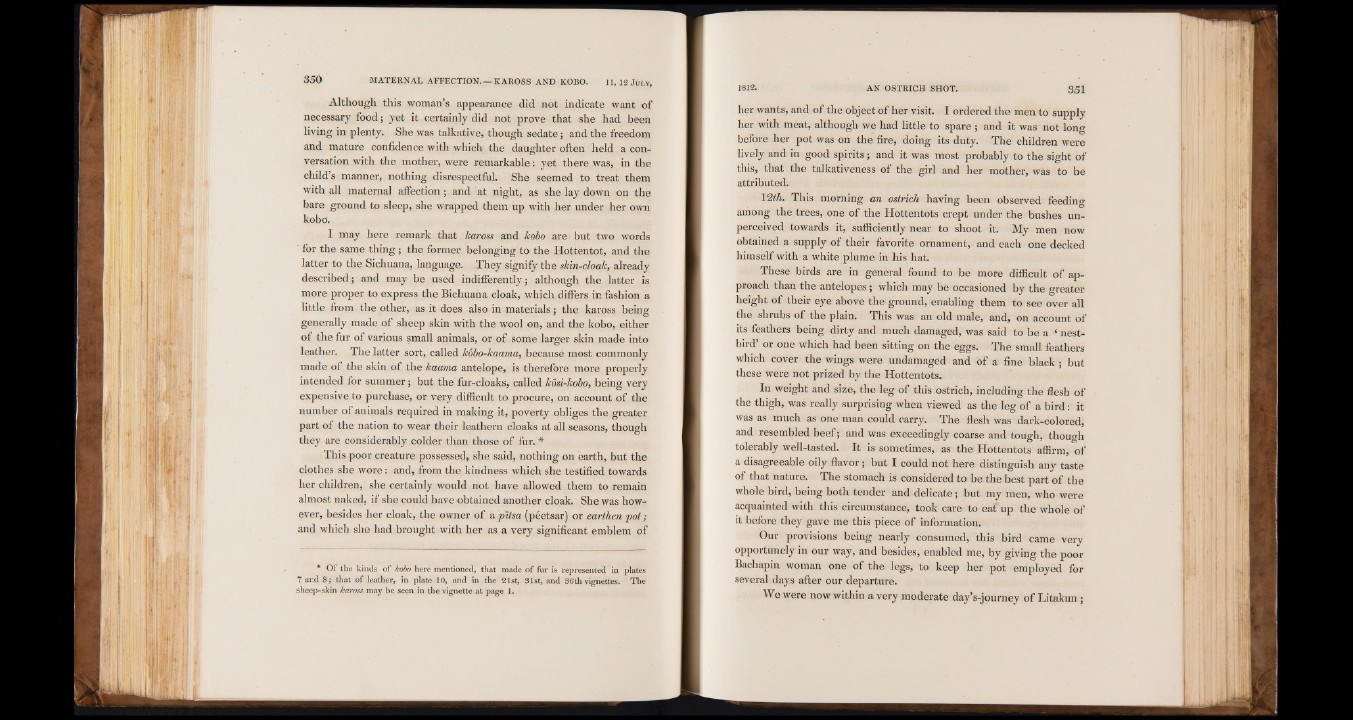
Although this woman’s appearance did not indicate want of
necessary food; yet it certainly did not prove that she had been
living in plenty. She was talkative, though sedate; and the freedom
and mature confidence with which the daughter often held a conversation
with the mother, were remarkable : yet there was, in the
child’s manner, nothing disrespectful. She seemed to treat them
with all maternal affection; and at night, as she lay down on the
bare ground to sleep, she wrapped them up with her under her own
kobo.
I may here remark that kaross and kobo are but two words
for the same thing; the former belonging to the Hottentot, and the
latter to the Sichuana, language. They signify the skin-cloak, already
described; and may be used indifferently; although the latter is
more proper to express the Bichuana cloak, which differs in fashion a
little from the other, as it does also in materials; the kaross being
generally made of sheep skin with the wool on, and the kobo, either
of the fur of various small animals, or of some larger skin made into
leather. The latter sort, called kobo-kaama, because most commonly
made of the skin o f the kaama antelope, is therefore more properly
intended for summer; but the fur-cloaks, called kosi-kobo, being very
expensive to purchase, or very difficult to procure, on account of the
number of animals required in making it, poverty obliges the greater
part of the nation to wear their leathern cloaks at all seasons, though
they are considerably colder than those of fur. *
This poor creature possessed, she said, nothing on earth, but the
clothes she wore: and, from the kindness which she testified towards
her children, she certainly would not have allowed them to remain
almost naked, if she could have obtained another cloak. She was however,
besides her cloak, the owner of a pitsa (peetsar) or earthen pot;
and which she had brought with her as a very significant emblem of
* Of the kinds of kobo here mentioned, that made of fur is represented in plates
7 and "8 ; that of leather, in plate 10, and in the 21st, Slst, and 36th vignettes. The
sheep-skin kaross may be seen in the vignette at page 1.
her wants, and of the object of her visit. I ordered the men to supply
her with meat, although we had little to spare ; and it was not long
before her pot was on the fire, doing its duty. The children were
lively and in good spirits ; and it was most probably to the sight of
this, that the talkativeness of the girl and her mother, was to be
attributed.
12th. This morning an ostrich having been observed feeding
among the trees, one of the Hottentots crept under the bushes unperceived
towards it, sufficiently near to shoot it. My men now
obtained a supply of their favorite ornament, and each one decked
himself with a white plume in his hat.
These birds are in general found to be more difficult of approach
than the antelopes ; which may be occasioned by the greater
height of their eye above the ground, enabling them to see over all
the shrubs of the plain. This was an old male, and, on account of
its feathers being dirty and much damaged, was said to be a I nest-
bird’ or one which had been sitting on the eggs. The small feathers
which cover the wings were undamaged and of a fine black; but
these were not prized by the Hottentots.
In weight and size, the leg of this ostrich, including the flesh of
the thigh, was really surprising when viewed as the leg of a bird: it
was as much as one man could carry. The flesh was dark-colored,
and resembled beef; and was exceedingly coarse and tough, though
tolerably well-tasted. It is sometimes, as the Hottentots affirm, of
a disagreeable oily flavor; but I could not here distinguish any taste
of that nature. The stomach is considered to be the best part of the
whole bird, being both tender and delicate; but my men, who were
acquainted with this circumstance, took care to eat up the whole of
it before they gave me this piece of information.
Our provisions being nearly consumed, this bird came very
opportunely in our way, and besides, enabled me, by giving the poor
Bachapin woman one of the legs, to keep her pot employed for
several days after our departure.
We were now within a very moderate day’s-journey of Litakun ;